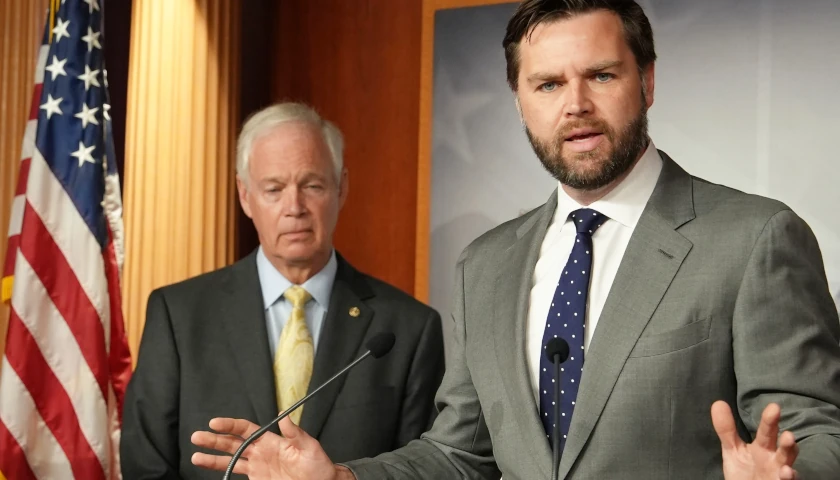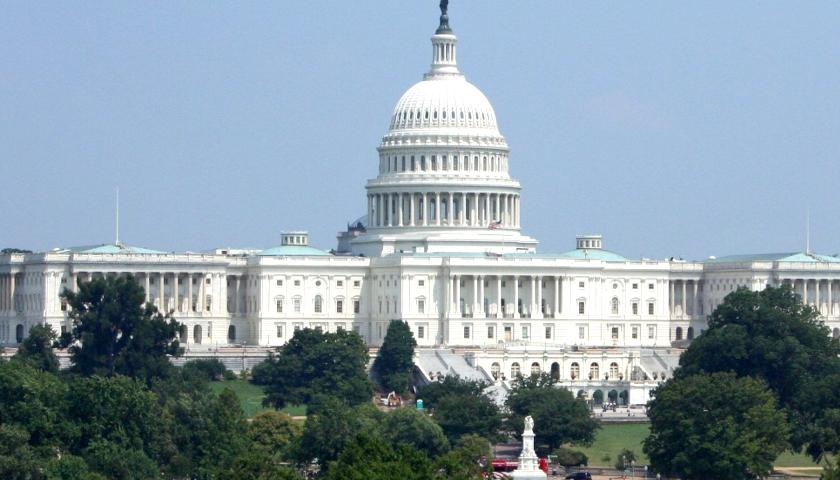by Shaun Kenney
Some quick polling numbers that should give people pause. The New York Times reports that 1 in 10 Americans believe “use of force is justified to prevent Donald Trump from becoming president.”
Statistics being a slippery and funny thing — one suspects Republicans aren’t echoing this statement — by extrapolation this means roughly 1 in 5 Democrats see the option for violence as a valid and legitimate path forward.
Violence is the antithesis of the political, or as the legal theorist Jedediah Purdy puts it — a name I am a bit surprised we have not heard more from in the wake of J.D. Vance’s meteoric rise — as the antipolitical.
As predicted, the Democrats don’t seem terribly interested in a deeper conversation about their embrace of the antipolitical in defense of so-called democracy.
In fact, the media reaction in the wake of the assassination attempt on Trump was to put it kindly obtuse, unfeeling, and unrepentant. The New Republic chose not to pull their weekly edition branding Trump as an American Hitler. Likewise, the New York Times elected to continue their Sunday print run labeling Trump’s movement as — you guessed it — fascist. CNN and MSNBC continue to downplay the gravity of what nearly happened.
Where I am leaving it with Democratic friends are on three salient points:
- Republicans are not in a position resolve Democratic problems. Insofar as my liberal friends recognize that there is a violence problem in the Democratic Party — and most do not see it and cannot admit it — it is their duty to challenge their own antipolitical sentiments within their own movement.
- Republicans do not owe Democrats some form of noblesse oblige when it comes to violence or the antipolitical. Nor do we have to swallow lectures from those who brand anyone with a dissenting opinion as hostis humanis generis — treating us as enemies of the human race outside the protections of civility and law.
- Start engaging with Republican voices on their own terms. Forget the New Right. Shocking to me still is that even conservative viewpoints are still unacceptable among the so-called tolerant. William F. Buckley put it best:
“Though liberals do a great deal of talking about hearing other points of view, it sometimes shocks them to learn that there are other points of view.”
— William F. Buckley, Up from Liberalism (1959)
At present, the Democrats just aren’t getting it. Maybe the op-eds are in the can waiting to peel the paint off of the fifth of their party who sees violence as an option, but is anyone holding their breath? Not I — not anymore.
J.D. Vance and Catholic Integralism
I met J.D. precisely once at an event in Washington, just at or around his conversion to Catholicism in 2019. Very pleasant if somewhat reserved, but never cold. In fact, quite warm and glad to be where he was.
First and foremost, if you haven’t read is 2016 Hillbilly Elegy, it is a book one should sit down and read with interest. The parallels to Jedediah Purdy’s 1999 For Common Things should not be missed; the parallels to Jim Webb’s 2005 Born Fighting should not be missed either.
This is the new Republican Party.
Of course, the media has noted — purely for the purposes of sowing division — that Vance was originally a Never Trump Republican. Vance’s criticism of Trump cooled in 2020, and by 2022 the former president had endorsed Vance after a series of meetings where Trump had a stack of the “nasty shit” Vance had said about him in the past.
So what bridged the gap? Times change, economies get worse… a decent golf game, a two-year wooing in the halls of the U.S. Senate… and friends like Peter Thiel.
More than this, there is a sentiment that Trump and Vance share in their anti-establishmentarian viewpoints. At core, both are perfectly willing to defy narratives. Both hold the media in a certain kind of contempt. Both share a sort of Forgotten Man orientation when it comes to working class America. Neither of them are Washington insiders.
I don’t have much insight as to how or why Vance made the transition from Never Trump Republican to vice presidential nominee other than to say that Vance himself was perhaps never quite a conservative in the first place — a communitarian most certainly, yet certainly someone who saw and felt how exportation of working-class jobs impacted his world.
Secondly, that his conversion to Catholicism offered a sort of moral framework to his evolving political viewpoints — an evolution that is both sincere and fluid given the nature of the ‘Dead Consensus’ members of the New Right and their influence in Washington and New York.
Third and perhaps most important to Trump? Vance was willing to shed certain key principles for the sake of the politically possible. Vance continues to take direct criticism from the pro-life movement for acquiescing to the jettisoning of the pro-life plank. Vance’s remonstrations of loyalty to the former president are not merely a consequence of his political shift, but rather a prerequisite from which certain political alterations are a consequence.
While the press will call this loyalty or worse, a more charitable way to cage Vance’s shift from Never Trump to Vice President would be team player. Which — if one is willing to sacrifice such things — is certainly part of the game.
Yet what the press seems most interested in — at least, insofar as it feeds the so-called Christian Nationalism trope — is Vance’s interest in integralism and particularly its Catholic variant.
Of course, this has more to do with liberalism as a political philosophy, but it at least sounds scary and therefore has great political currency. The integralist argument runs something close to this: that lawmaking is an inherently moral process, that we routinely ask lawmakers to approve of moral laws, reject immoral laws, and have the integrity to discern between the two.
The liberal argument counterpunches by begging the question of whose morality? Surely if one believes that morality is a social construct, then questions such as value and moral right become utterly subjective contests. Surely in that contest, pluralism will not do. Surely, they argue, the grand solution is the extirpation of any moral sentiment in favor of a system of lawmaking which preserves the autonomy of persons and lessens the consequences for bad behavior — freedom as license provided one does not hurt anyone else.
Apart from the obvious repartee — that sounds like an awfully moral argument for liberalism, doesn’t it? — the defenders of tradition will raise their fingers and ask the pointed and more uncomfortable questions. Is our objection to rape merely a social construct? Is our objection to pedophilia merely a social construct? Is our objection to coercion merely a social construct? Do we not live in a physical reality where — try as I might — my ability to become an astronaut or linebacker for the Washington Redskins isn’t precisely on the table? Liberals will hedge that personal autonomy requires consent. Critics will respond that such consent implies the existence of something spooky and metaphysical the moment we imply the need for such categorical imperatives or universal laws.
Physics, mathematics, biology, chemistry — the hard sciences in general — these are all universal no matter how we may feel about their implications. Yet they also have the additional benefit of being intelligible by human reason, of being interconnected in the sense that physical laws do not conflict with the laws of mathematics, chemistry, biology, etc.
So too with moral reasoning. So too, it stands, with good lawmaking.
That good lawmaking should have integrity in the sense that it is integral is the whole point of a good integralism. That’s how polities work for the common good. This is not the linking of church and state — this is the bedrock of a good politics which rejects in toto both the appetitive and the antipolitical, precisely because a lack of such integration — bad lawmaking — has a disintegrative effect.
The Velocity of the New Right: European or American?
Insofar as this appeals to the reader, this is the vanguard that J.D. Vance represents among young thinkers on the right today. This does not mean that such a politics — and the emphasis on the New Right is indeed on the nouvelle rather than the droit — will necessarily mimic the European far right. Certainly, Vance could represent a revivification of conservative values in some fashion. Certainly, there is a communitarian emphasis which will appeal to a different coalition of voters than the traditional Republican voter may have considered in the past. There is indeed a core group of thinkers and activists who readily espouse the integralist line, and specifically a Catholic form of it — and they are thinkers, not future gauleiters as the fearmongering on the left would have folks believe.
As for what Vance believes at core? One suspects that we will find out over the course of time, hopefully unvarnished by the lens of a media set out to destroy the man before he can define himself. Whether or not the sacrifices he makes as a politician in order to weld himself to the Trump movement are good or bad, temporary or permanent, remains to be seen. The role of the vice presidency is not precisely a policy-driven role, though there are exceptions (see: Dick Cheney).
Yet if one is looking for a very short, in crayon, what is the guy really like perspective? Neither conservative nor populist, but sharply communitarian.
Whether he will be able to turn “political heroin” into political heroism remains to be seen. Some of this depends openly on whether or not the direction of the movement follows the lead of the European right — De Benoist, Evola, the “Gramscians of the Right” — or whether it adopts a more American and Jeffersonian tone.
Yet Vance’s views and political orientation for those more serious-minded about ideas are not terribly difficult to understand or find — nor are they political kryptonite. Rather, Vance represents a vanguard of political thinking which will indeed be something novel and serious in American politics on its own terms rather than the caricatures of others — a solution to the problems of liberalism which refuses to surrender its virtues in favor of its vices. That’s worth exploring — right?
Here’s looking forward to Vance’s acceptance speech this evening where we will get a glimpse of the man’s integrity and path forward. There will be a lot to stitch together and explain — Never Trump, Ukraine, Appalachia, the New Right, Trump — but J.D. is most certainly up to the task.
On that, I’ll bet.
– – –
Shaun Kenney is the editor of The Republican Standard, former chairman of the Board of Supervisors for Fluvanna County, and a former executive director of the Republican Party of Virginia.
Photo “JD Vance” by JD Vance.





